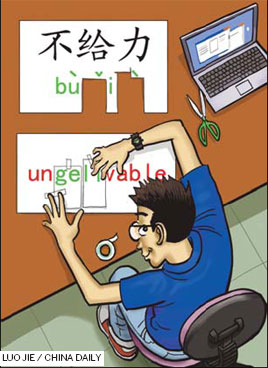Life and Leisure
Its gelivable! The whole world's speaking Chinese
By Jules Quartly (China Daily)
Updated: 2010-11-17 07:59
 |
Large Medium Small |
It always amuses me when someone says the lingua franca is English because they require bastard Latin to do so. Furthermore, the lingua franca, or default language, keeps changing.
In Europe, it used to be Latin, German and of course French in aristocratic circles. Since the 20th century the lingua franca (literally Frankish tongue) has not been English, as advertised, but American-English. Put simply, might is right.

Which, by way of a forward, brings us to the development of Chinese as a lingua franca. Not in my lifetime, of course, but since the Middle Kingdom is now in the economic passenger seat and about to take the wheel, it is inevitable that its language gets a look-in too. And you may have noticed that Chinese words, and even characters, have become international currency.
Case in point is the brilliantly arcane geili, which is transliterated as "give power" and basically means "awesome" - but, oh, so much more. It has been heavily promoted by the most unlikely of sources, the People's Daily, which nearly caused a linguistic revolution when it put the characters in a front-page headline.
Further, it has been pinyined (another new word), dropped an "i" in the process and become a noun (gelivability) and best of all an adjective (gelivable).
Now, it has found a soft landing in the Bible of lexical noveltude, the Urban Dictionary, where the word is attributed to Chinese Internet users and "describes the gap between reality and the ideal. If they are the same, we can say 'gelivable'; if not, we can say 'ungelivable'. When I feel disappointed, I can say, 'that's so ungelivable!!!'".
Not to be outdone, the French are saying trs gulile, or "so cool!"
While zanjin, from the western provinces, also meaning "really cool" is jostling for national recognition, slang that deserves an international audience is fuwosheng, or "push-up". This refers to a case a few years ago when some second-generation rich kid tried to get off a murder rap by saying he did not push his girlfriend into the river, where she drowned, but rather he was doing push-ups when she fell in. It now means "bullshit".
Then there's da jiang you, or "buying soy sauce", which means, "I don't know and I don't wish to know". After some incident a reporter asked a witness what he saw and this was his response. Basically, it's none of my business (or yours).

The Internet is responsible for the rapid spread of most buzzwords and since it has global reach, it is to be expected that the weight of Chinese numbers will push much more pinyin onto the world stage.
As for characters, "", or jiong, meaning sad or depressed, is "one of the 21st century's most popular characters", according to Baidu.
Then there are Chinese sayings. I didn't realize and I'm sure you didn't either, but apparently the English phrase, "long time, no see" is a transliteration of the common Chinese greeting hao jiu bu jian.
And don't forget Chinglish! There's going to be more, not less, if the Save Chinglish Facebook website has a say in the matter. Its 9,000-plus fans are adding daily to the world's vocabulary. My favorite at the moment is "niubility", which is a play on the word niu, meaning proud.
If you are not convinced of the argument that Chinese is spreading around the world by now, then you are not living on the same planet as a fifth of the world's population. To underline the fact is a popular song from the girl group S.H.E. called Zhongguo Hua (Chinese Language), the lyrics of which go:
For many years we have painstakingly practiced English pronunciation and learned English grammar/ Now it's their turn to roll their tongues and learn Chinese tones.